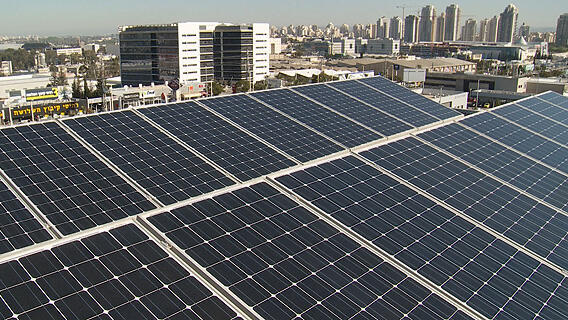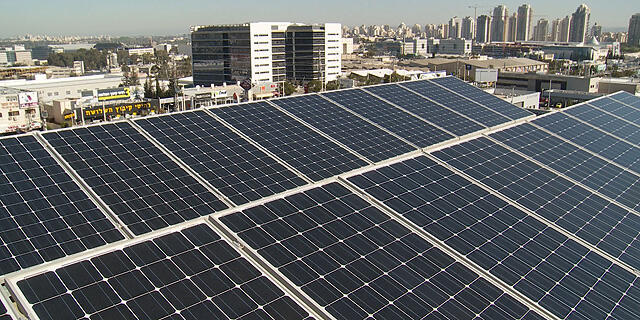
Investment in Israeli climate tech is shrinking at an alarming rate
According to the Israel Innovation Authority's report on Israeli climate tech, investment in the field in the first half of 2023 amounted to $551 million dollars - a 60% decrease, compared to a global investment decrease of 40%
The number of Israeli climate tech startups increased by 13% in the climate tech sector in 2022, and the entire sector raised $2.3 billion. In fact, for every dollar invested in Israeli high-tech, 14 cents were directed towards the climate tech sector. One out of every six newly established companies is a climate tech company, making up about 17% of tech companies. These figures were presented in a report by the Israel Innovation Authority and PLANETech, a joint initiative of the Israel Innovation Authority and UK-based Consensus Business Group led by entrepreneur Vincent Tchenguiz.
The report was published amid the ongoing UN Climate Conference in Dubai, where the Israeli delegation has been showcasing local tech companies. The development of the climate tech sector is strategically significant for Israel's international commitments to addressing the climate crisis. The report also highlights concerning data indicating unique challenges for the local industry. The climate tech sector has shown significant resilience compared to other areas in Israeli tech which suffered from the global economic downturn. The report claims a 400% immunity, as total investments in Israeli tech decreased by 47% from 2021-2022, whereas climate tech only experienced a 10% decline.
However, in the first half of 2023, the situation changed, and the climate tech sector witnessed a significant drop similar to the global market, by roughly 60%. This occurred despite a 320% increase in government funding for the sector in Israel in 2018-2021 - a rate 2.6 times greater than the global growth rate. In the first half of 2023, total investments in the Israeli climate tech sector amounted to $551 million.
The data on the first half 2023 is cause for concern since global climate tech demonstrated relative immunity during this period of time as well. In Israel, the trend has stalled, and the sector experienced a significant decrease in investments in the first half of the year, similar to the rest of the local economy, and unlike the rest of the world. For example, according to an October report entitled “State of Climate Tech” by consulting giant PwC in October, venture capital and private capital investment in climate technology fell by 40% in 2023. However, private investment in the entire economy dropped by 50% or more so these results are actually relatively good.
Related articles:
According to the report, which maps out the Israeli climate tech sector, there are currently 784 climate tech companies (compared to 694 in 2021) operating in diverse fields from reducing emissions and eliminating greenhouse gasses to agriculture, water, infrastructure, food and software. The definition of what constitutes climate tech is very broad, and can include a variety of companies that even deal with the issue indirectly rather than as a central goal.
Over the years, different companies have fallen under the broad definition, leading to variations in the number of companies defined as climate tech. For example, according to a June report, only 518 startups were recognized as climate tech, 266 less than the current report. Additionally, a significant portion of these companies cannot quantify their climate impact. According to a survey, only 54% of companies can measure the environmental benefits of their products in terms of reducing greenhouse gas emissions fully.
Despite these challenges, as of 2022, many companies at 44% are still at the Seed stage, with less than 8% having advanced to Series B funding rounds. Furthermore, 52% of investors in the Israeli ecosystem are local, while 48% are foreign, mostly from the United States. Carbon management, risk and capture, and sequestration are the two areas with the most companies in the last three and a half years, although these companies have yet not raised significant capital.
In 2022, the Israel Innovation Authority allocated 16% of its budget ($71.4 million) to 273 different initiatives in the climate tech sector. This indicates that Israel has not fully implemented a government decision made in June 2022 to allocate approximately $3 billion to the sector by 2026. The government called this decision "historic" but did not specify a budget, postponing detailed planning until 2023.
The Netanyahu government has not allocated funding to this sector, but nevertheless the Innovation Authority predicts that the government will invest more than NIS 1 billion ($270 million) this year in the climate tech field and meet the goals it has set. This is mainly due to Israel's participation in the European Union's Horizon 2020 program, which invests NIS 8 billion ($2.6 billion) in innovation over seven years. Thirty percent of funds are invested in climate, so the IIA estimates that a portion will be directed to Israeli companies in the field. In 2022, according to the IIA’s estimate, 22 million Euros ($24 million) reached Israeli startups through Horizon. It is worth noting that the chance of receiving funding for Horizon projects is low, at 19%.
Dror Bin, CEO of the IIA, says that "the climate crisis is the most significant global threat to humanity today. We are all feeling its consequences right now. In Israel there is enormous potential in the field and it is our duty to continue to harness all the relevant players and make sure that they have the necessary tools at their disposal for continued growth and prosperity." This year, the IIA will be forced to face the many local challenges in addition to the global ones, in order to find a way to advance climate tech in Israel.
The report emphasizes that Israel must find ways to overcome both local and global challenges to help the climate tech sector thrive. A survey conducted among 210 companies as part of the current report reveals significant barriers faced by Israeli entrepreneurs, mainly funding and growth capabilities, particularly scaling up production. In addition, entrepreneurs indicated struggles with regulation, distance from target markets, and availability of pilot sites. Regarding growth capabilities and scaling up, 40% of companies reported challenges, compared to 28% in 2021. The report suggests that the government will now need to take actions such as infrastructure development, regulatory barrier removal, and promotion of collaborations to address these obstacles and promote growth.
Shani Zanescu, PLANETech CEO, climate tech investor, and advisor to the Consensus Business Group, says that the unique funding challenges faced by climate tech companies demands a comprehensive approach. Climatetech companies typically require long-term development processes, making funding challenges different from those in traditional industries.
According to Zanescu: "Companies need to consider integrating various types of funding, such as issuing bonds (spread over the company's lifetime), raising funds from infrastructure funds, and government grants like the U.S. IRA ($309 billion) or the EU’s Green Deal. Another option is collaboration with corporations. The world's largest corporations are currently committed to embedding technologies to reduce emissions, so they have an interest in creating pilot programs and partnership agreements with early stage climate tech companies. Such partnerships would allow companies to bridge funding gaps. Many climate tech companies start in the lab, but they need to learn to communicate with the market as quickly as possible to ensure that their product solves a real problem and has growth potential."
